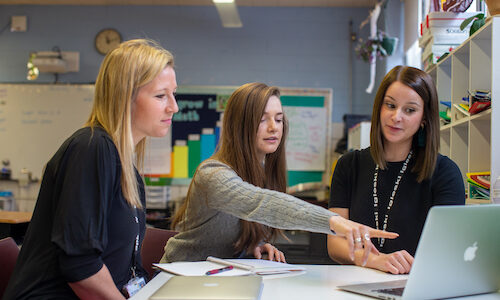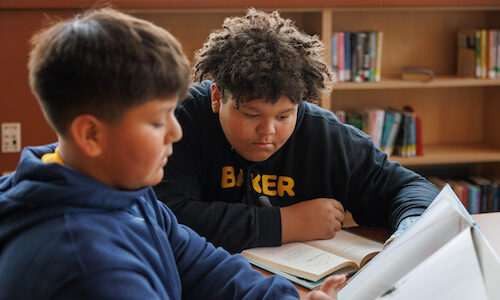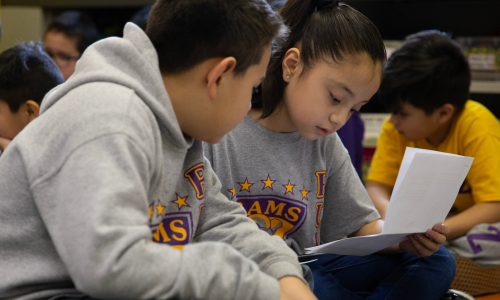
The end of the school year is a time for celebration and reflection—and it’s important to make sure instructional coaching doesn’t get swept aside by urgent tasks, like testing season and end-of-year events.
Here are four important conditions that can help a coach stay centered during a potentially chaotic time of the school year.
Condition #1: Reflection
It’s easy for the school year to rush by and for teachers not to have the opportunity to really reflect on all their progress with students. Coaches should focus their coaching conversations on facilitating teacher reflection. For instance, a coach could design an end-of-year reflection meeting that includes questions to help teachers identify significant learning moments of the year, as well as cement ideas for the fall. Here are some possible questions to include:
- What did you learn about your teaching practice this year?
- What worked well? Why?
- What didn’t work so well? Why?
- What will you do differently next year?
- What did you learn about your students?
- What strategies or content remained sticky in your students’ learning?
- What do you most want your students to remember?
If a coach has worked closely with a teacher over the school year, this can also be a great time to ask reflective questions related to the coaching experience, such as:
- Have you implemented new teaching strategies because of working with your coach? If so, can you give an example?
- How has coaching made a direct positive impact on your professional practice?
- Overall, what has been useful to you about working with a coach?
Condition #2: Time
Expect the unexpected, and block out time in your calendar for end-of-year planning and coaching meetings with teachers.
Coaches are often asked to take on a wealth of “other duties as assigned” as the last day of school approaches, so it’s important for you to have a plan for what you are willing to take on (such as helping with an assembly) while still focusing on the true nature of coaching. If your calendar becomes loaded with competing tasks and responsibilities, evaluate which tasks are most closely aligned with coaching. Possible questions to ask yourself:
- Which tasks support teacher planning, reflection, and/or celebration?
- Which tasks support student reflection, achievement, and/or celebration?
- Which tasks can I reasonably take on without compromising my focus on student and teacher learning?
- Which tasks won’t have much lasting impact?
- Which tasks can be delegated or eliminated?
Condition #3: Collaboration
Whether it’s co-planning with teachers or working with your principal to plan for the fall, remember that true collaboration includes the exchange of ideas and viewpoints, as well as a shared set of responsibilities. In other words, you can’t (nor should you) do everything by yourself. Coaches should also strive to create collective and collaborative opportunities for teams to reflect on their work together. Consider these reflection questions for teams:
- Have you seen one of your colleagues go beyond the call of duty sometime this school year? Please share.
- How have the attitudes and actions of your colleagues positively affected your experience as a teacher this year?
- What is one thing about our team that you hope will never change?
Condition #4: Celebration
Endings are full of joy and relief for teachers, so find ways to incorporate evidence of success into your celebrations.
A coach should identify a variety of ways to highlight the positives and successes of the teacher and their students. This could be in the form of student work, a strategy or lesson a teacher implemented, or even a significant learning event. Here are some ideas for ways to highlight success:
- Student work samples from a favorite unit or project
- Individual or collective student growth from a formative assessment
- Student responses on an engagement survey
If teachers’ schedules are completely full and you aren’t able to sit down with a teacher to discuss specific evidence of growth, then a thank you letter noting the teacher’s contributions to their classroom or the school can still be a meaningful way to acknowledge and celebrate their efforts.
You’re invaluable
Coaches serve a unique and special role in their schools, and being mindful of the conditions explored in this post can ensure a more rewarding and satisfying end-of-year experience.
Coaches also serve to solidify powerful memories and beliefs about learning for teachers, so they should consider how the end of a school year is not simply closing down for the summer. As Louis L’Amour says, “There will come a time when you believe everything is finished. That will be the beginning.”
To learn more, visit our archive of posts on instructional coaching here on Teach. Learn. Grow.







